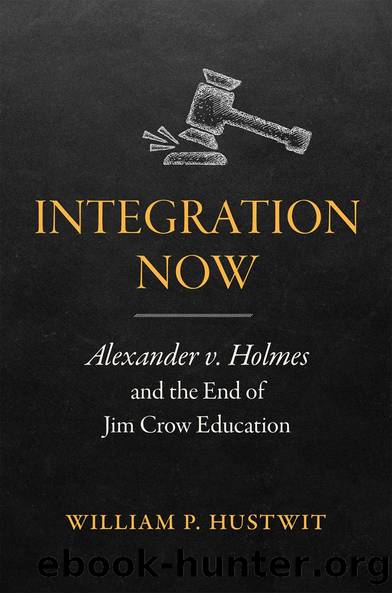Integration Now by William P. Hustwit

Author:William P. Hustwit [Hustwit, William P.]
Language: eng
Format: epub
Tags: Social Science, Ethnic Studies, American, African American & Black Studies, Law, Civil Rights, Legal History
ISBN: 9781469648569
Google: bYGGDwAAQBAJ
Publisher: UNC Press Books
Published: 2019-02-05T05:13:44+00:00
The court of public opinion in Mississippi was predictably dyspeptic. Jacksonâs Clarion-Ledger ran a racially tinged headline: âSupreme Court Orders Immediate State Mix.â Alexander v. Holmes rudely awakened state officials. State Superintendent of Education Garvin H. Johnston was âvery much surprised, amazed and appalled that the court would put such a requirement of school districts in the middle of the year.â James Eastland recovered Robert Finchâs doomsday scenario: âThe decision spells disaster for public education in Mississippi and many parts of the South.â Back home in Yazoo City, a still-hopeful John Satterfield swore to file an appeal with the Supreme Court and fight on in the Fifth Circuit with objections to the ruling. Mississippi attorney general A. F. Summer promised state assistance to any school board that requested legal help. âAll deliberate speedâ meant ânow,â he told WLBT, Jacksonâs NBC affiliate. âGod helpâ the school boards âas they try to implement this ruling.â The Memphis Commercial Appeal struck a more balanced tone and reported, âWhat happened this week spells the end of one social era and the beginning of another. Surely there will be pragmatic efforts at delay, further frustrations of the intent of the Supreme Court and its interpretation of the constitution. But the gauntlet appears to be down.â22
Hodding Carter, the liberal editor of Greenvilleâs Delta Democrat Times, regarded the Courtâs ruling as an epochal event and braced his readers for integration:
The inevitability of school desegregation now stares white Southerners square in the face, and it is equally inevitable that many will seek to flee from it into private schools or away from their communities. Their reaction will not be something uniquely Southern, but typical of White Americans everywhere when faced with the prospect of large numbers of black Americans attending school with their children. ⦠The demagogues will seek to capitalize on white fears, even if it means the destruction or serious weakening of the public school systemâand consequently of their stateâs future. Too many moderates will remain silent, although apprehensive about the possibility. For us, the courtâs decision simply means that more money, more thought and more care must be directed into the public schools so that all our children, black and white, do not have to suffer needlessly because of their eldersâ mistakes.23
Massive integration had finally dawned in the heart of Mississippi. On the ground in Holmes County, Hazel Brannon Smith urged her white neighbors to remain calm. The normally feisty editor appealed to their better angels: âWhat is needed now from all citizens is a great deal of wisdom, courage and an understanding of what must be done.â She dedicated a front-page editorial to the recent visit of the Reverend Hosea Williams, former confidant of the slain Martin Luther King Jr. While the Supreme Court had deliberated Alexander, Williams had presented Robert Clark with a civil rights award for becoming the stateâs only black legislator since Reconstruction. Smith quoted Williams, who vaulted the people of Holmes to âthe brink of history. You can become one of the first counties in America to help redeem its soul.
Download
This site does not store any files on its server. We only index and link to content provided by other sites. Please contact the content providers to delete copyright contents if any and email us, we'll remove relevant links or contents immediately.
| Civil Rights | Discrimination |
| General | Human Rights |
Day by Elie Wiesel(2786)
The Age of Genius by A. C. Grayling(2592)
Gideon's Spies: The Secret History of the Mossad by Gordon Thomas(2355)
The Gulag Archipelago (Vintage Classics) by Aleksandr Solzhenitsyn(2106)
FATWA: Hunted in America by Pamela Geller(2013)
Columbine by Dave Cullen(1870)
Men Explain Things to Me by Rebecca Solnit(1729)
The Rule of Law by Bingham Tom(1701)
Anatomy of Injustice by Raymond Bonner(1671)
Examples & Explanations: Administrative Law by William F. Funk & Richard H. Seamon(1649)
Three Cups of Tea by Greg Mortenson(1620)
The Source by James A. Michener(1618)
That Every Man Be Armed by Stephen P. Halbrook(1584)
ADHD on Trial by Michael Gordon(1581)
Future Design by Unknown(1580)
Gideon's Spies by Gordon Thomas(1512)
Palestinian Walks by Raja Shehadeh(1499)
Constitutional Theory by Carl Schmitt(1458)
Nothing to Envy by Barbara Demick(1451)
